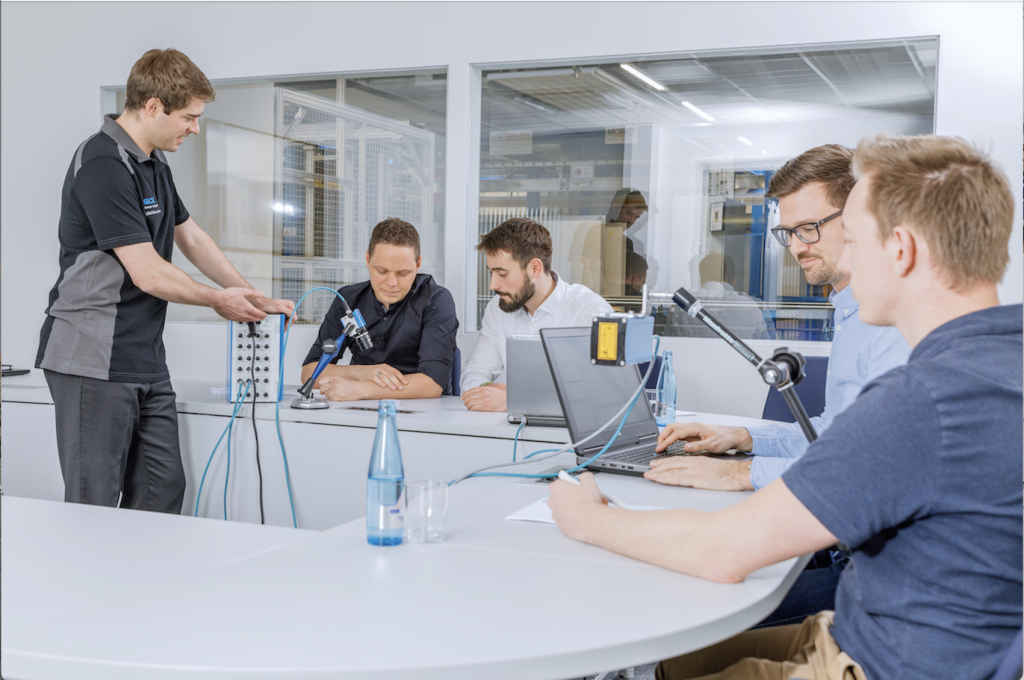
Sensing future innovations with SICK Canada
December 7, 2021
By Des Carter
 Photo: SICK Canada
Photo: SICK Canada Advanced manufacturing is constantly changing the way we live and work. It’s not only about installing digital interfaces in traditional infrastructure or streamlining operations, it also uses technology and data purposefully to make better decisions and improve everyone’s quality of life. Using sustainable methods and materials means building a great career and a better future for all.
Achieving a leading position in the future requires ongoing investment in research and development. SICK Canada (SICK) partnered with Humber College not only to invest in research and development but to co-create a SICK Sensor Lab in Humber’s Barrett Centre for Technology Innovation (Barrett CTI). This investment reaffirmed SICK’s commitment to research and development while supporting leaders of the future. In 2018, SICK made a commitment to Humber College’s Barrett CTI to develop a state-of-the-art technology lab that incorporates sensor intelligence for connecting systems and technology.
Through SICK’s close cooperation with post-secondary institutions in its headquarters in Germany, SICK leveraged opportunities to advance the skills of our students here in Canada. Leveraging Humber’s technical expertise, we have invested as a key partner to create proof of concepts (POC) and enable innovation with Humber’s third-year Electromechanical Engineering Technology students to design and implement new applications for future projects. Two student-driven projects, the Humber “Hawk Automated Guided Vehicle” and the “Brick Sleeve” use SICK’s vision and detection sensors, as well as LiDAR technology in a (POC) Humber drone. SICK is also working with Humber staff and students to enhance the robotic labs throughout the Barrett CTI facility.
A key purpose of the SICK Sensor Lab is to showcase how digital transformation is gaining traction among Canadian companies. Typically, companies invest for a few reasons: to improve business processes, create additional value for customers and foster innovation. Prior to the lockdown, SICK technology experts hosted solutions training at the Barrett CTI to introduce “SICK AppSpace: Intelligent solutions” for identification, positioning, detection, inspection and quality assurance. SICK technology experts have created a wide range of scalable portfolios of 2D and 3D vision sensors and have equipped the Barrett CTI with AppSpace and vision technology to create automation architecture that will adapt in the wake of Industry 4.0. With the advances in research and technology over the past year, the AppSpace software can now be used on sensors in addition to computers. The software is able to communicate with the cloud – either directly or via a Sensor Integration Machine (SIM).
A key purpose of the SICK Sensor Lab is to showcase how digital transformation is gaining traction among Canadian companies.
With computing capacity for individual programmable remotely, cross-technology sensor integration and sensor data fusion, it uses these components to make technology ready for the future. AppSpace provides a complete digital object transformation for data detection and archiving, quality assurance, process analysis and predictive maintenance within the digital transformation environment. Feedback from their built-in sensors allows them to navigate intelligently, establish boundaries of sensory technology and lay the foundations for future solutions.
SICK AppSpace offers users, system integrators and original equipment manufacturers the “freedom and flexibility” to independently develop application solutions that are tailored to the specific needs and requirements of any task. Whether it’s designing the ideal online user interface, selecting the most suitable programming technology, or distributing the sensor app on various SICK sensors, SICK AppSpace gives users the power to develop their own customized solutions. Users experience a simple graphical user interface on the front end while the software does all the heavy lifting behind the scenes.
SICK is extremely proud to work together with students, staff and businesses at the Barrett CTI. This is a tremendous opportunity to demonstrate that sensor intelligence is a promise to the present and the future. Digital transformation offers endless career choices. With the continued advancement of sensor technology as the data supplier for intelligent manufacturing, those career opportunities are infinite.
From October 6 to 7, SICK has done a physical tradeshow in Germany, as well as an international online conference. Titled SICK Solution World, the event discussed and showcased practical digital transformation solutions for all industries.
Now that’s intelligent.
Des Carter leads marketing and communications for SICK Sensor Intelligence. SICK is an industrial automation company that provides sensor applications and solutions that efficiently process, secure and protect individuals from accidents and prevent damage to the environment.
This article originally appeared in the October 2021 issue of Manufacturing AUTOMATION.
Advertisement
- Building a resilient supply chain with Microsoft Dynamics 365 Supply Chain Insights
- ABB announces appointment of Tyrone Varga to its Canada team